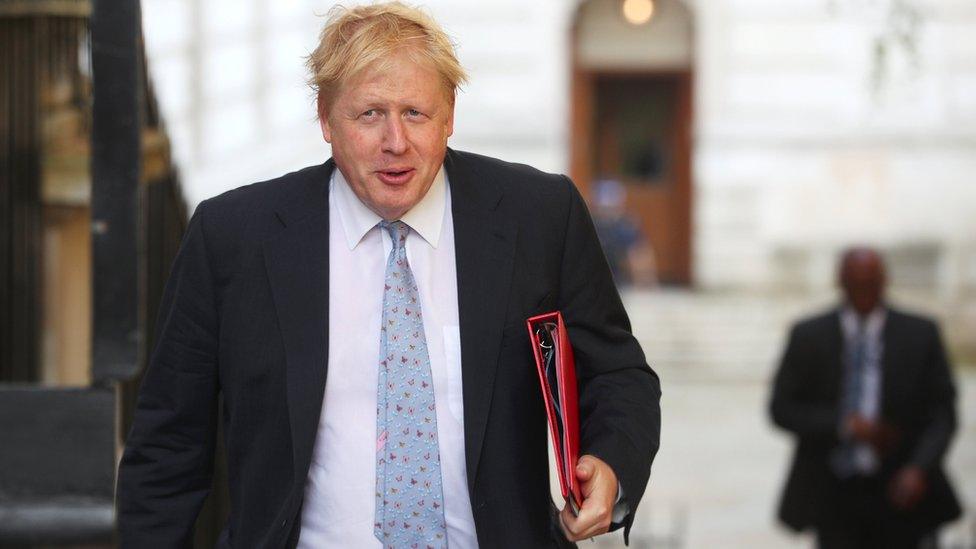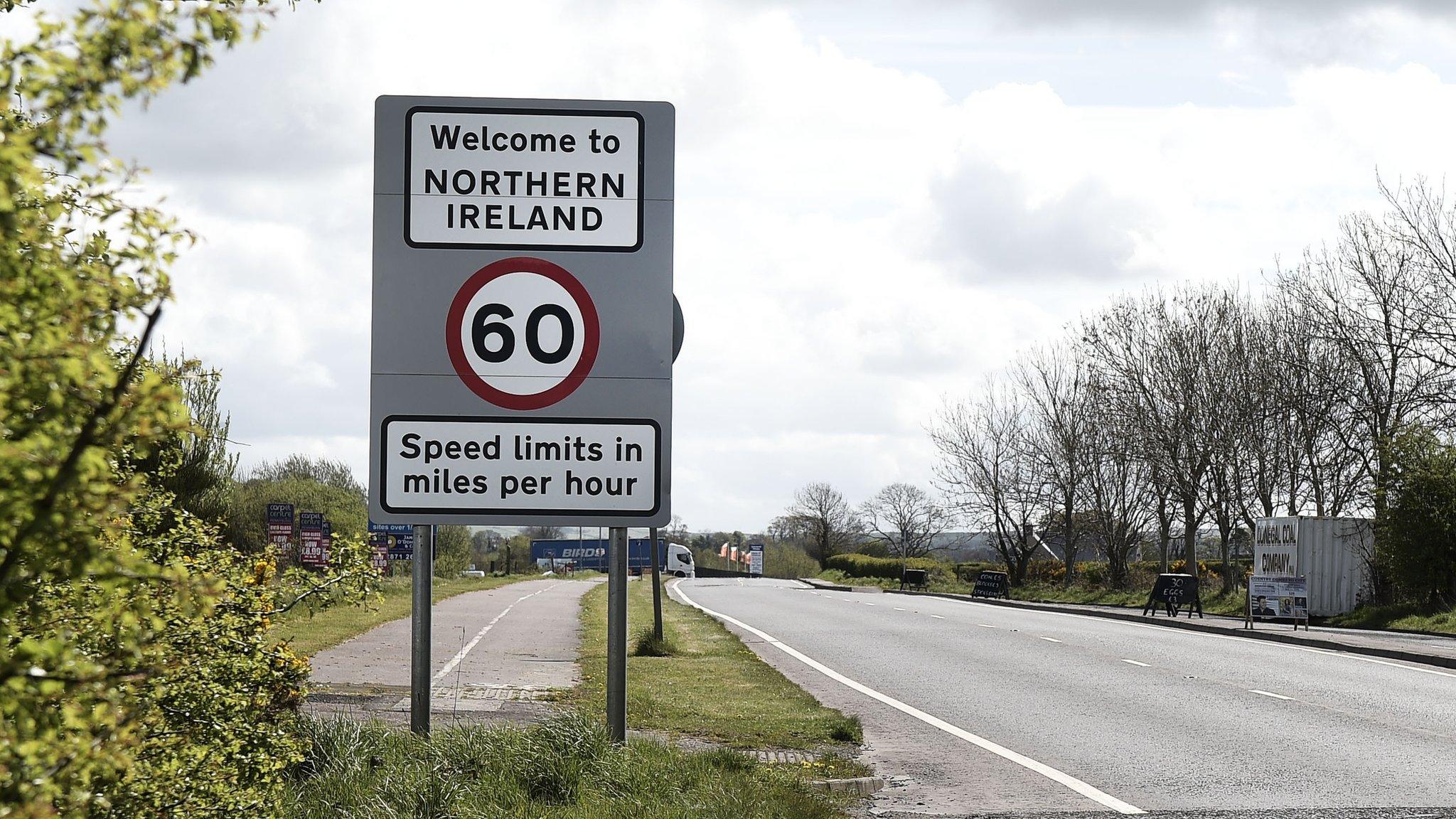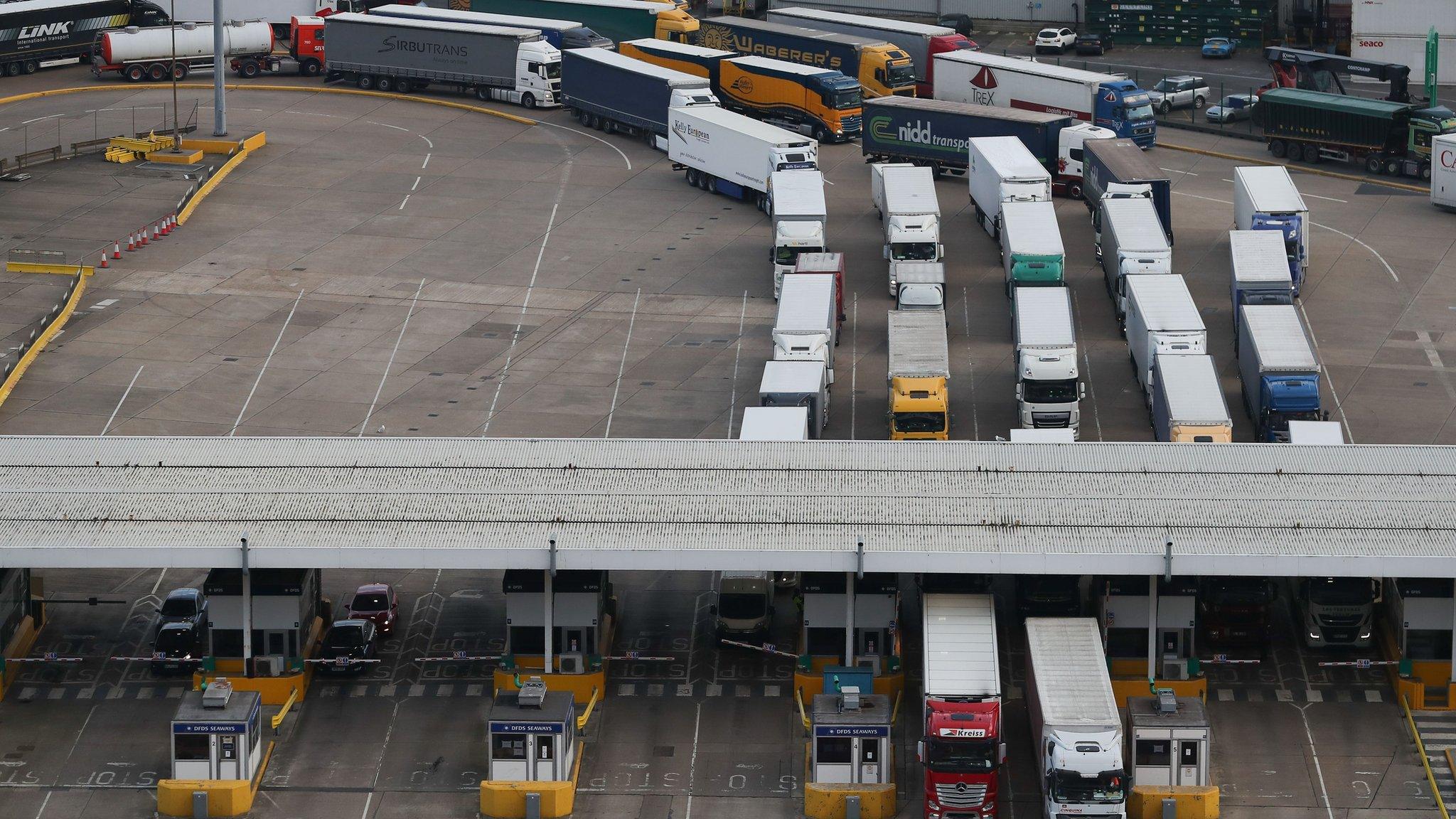Boris Johnson: No 10's post-Brexit customs plans 'crazy'
- Published
- comments

Boris Johnson has described one of No 10's proposals for a post-Brexit customs arrangement as "crazy".
A "customs partnership", thought to be favoured by the PM, would involve the UK collecting import tariffs on behalf of the EU, Mr Johnson said.
In a Daily Mail interview, external, the foreign secretary said it would limit the UK's ability to do post-Brexit trade deals.
No 10 said the idea was still on the table after ministers failed to agree a customs plan last week.
It also disputed the suggestion the UK would be collecting tariffs "on behalf of the EU" - saying that the money collected would stay in the UK although there would be an annual assessment of what the UK needed to pay the EU for tariffs collected on goods which had later moved on to the EU.
The newspaper quotes the foreign secretary as saying a customs partnership would create "a whole new web of bureaucracy".
"If you have a new customs partnership, you have a crazy system whereby you end up collecting tariffs on behalf of the EU at the UK frontier," he said.
"If the EU decides to impose punitive tariffs on something the UK wants to bring in cheaply there's nothing you can do.
"That's not taking back control of your trade policy, it's not taking back control of your laws, it's not taking back control of your borders and it's actually not taking back control of your money either, because tariffs would get paid centrally back to Brussels."
What is the EU customs union?
His comments were made during a trip to the US and he said a trade deal with America could not be achieved if the UK remained "in the lunar pull of Brussels".
He added that Americans wanted to see "a confident free-trading Britain able to do its own deals".

The politics of Johnson's intervention
BBC political editor Laura Kuenssberg
In normal times - when did we last have them? - if a cabinet minister publicly criticised the government of the day's policy in such colourful terms, they would be out - either by their own volition, or a P45 swiftly despatched from Downing Street.
This is a policy that Boris Johnson discussed, along with his colleagues, at that Chequers away day in February, and then by (literally) giving the thumbs up to the prime minister's Mansion House speech in March that included the customs partnership as a potential proposal.
What his supporters say is that the policy was not agreed then and not discussed in proper detail - so by staking his claim that the idea is "crazy", he is not bound by collective responsibility. This is an idea floating around rather than pinned-down government policy, they say.
The word is appallingly overused in politics but, let's put it in capitals, it is UNPRECEDENTED for a senior member of the government to pour such scorn on their government's own plan, one, they themselves signed up to not so long ago - not withstanding his team's belief that he is perfectly entitled to criticise a plan before there has been an official government decision to back it.

At the weekend Mr Johnson's cabinet colleague Business Secretary Greg Clark said anything other than a close customs arrangement would risk thousands of jobs.
The government's preferred option of a customs partnership has already faced heavy criticism from other Brexiteers - Conservative MP Jacob Rees-Mogg has described it as "completely cretinous".
On Twitter, Mr Rees-Mogg said Mr Johnson had "hit the nail on the head" with his Daily Mail interview.
Former Conservative leader Iain Duncan Smith said adopting the model, which has not been tried before, would "go against everything I know about government" and jeopardise the UK's ability to strike trade deals with other countries.
The idea was also criticised from the other side of the Brexit debate. Labour MP Rupa Huq - part of the campaign for another vote on the UK's EU membership - said it would create a "bureaucratic nightmare", adding that the best way to preserve jobs was to stay in the customs union and single market.

What are the government's options?
A 'highly streamlined' customs arrangement - This would minimise customs checks rather than getting rid of them altogether, by using new technologies and things like trusted trader schemes, which could allow companies to pay duties in bulk every few months rather than every time their goods cross a border
A customs partnership - This would remove the need for new customs checks at the border. The UK would collect tariffs set by the EU customs union on goods coming into the UK. If those goods didn't leave the UK and UK tariffs on them were lower, companies could then claim back the difference. No 10 says an annual payment would be made to balance the value of the tariffs collected by the UK for goods which ended up in the EU and the value of the goods which came via the EU but ended up in the UK

Liberal Democrat leader Sir Vince Cable said: "Yet again this Tory government is demonstrating to the Europeans who are negotiating with them that they are internally divided."
Former Tory attorney general Dominic Grieve said Mr Johnson's decision to speak out was "regrettable", telling BBC Radio 4's The World at One: "I don't think he is in any way inhibited by normal propriety in government."
Mrs May's official spokesman said that the issue was not discussed at Tuesday's regular cabinet meeting in 10 Downing Street, which Mr Johnson attended after returning from a visit to the US.
The spokesman said Mrs May had confidence in the foreign secretary, adding, in relation to the two customs options: "Following last week's sub-committee meeting, it was agreed that there are unresolved issues in relation to both models and that further work is needed.
"The prime minister asked officials to take forward that work as a priority."
- Published26 April 2018

- Published2 May 2018

